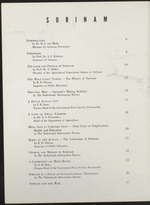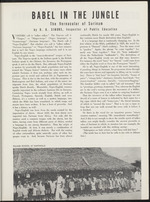| 1 |
 |
“...Agricultural Experiment Station in Surinam
The Wild Coast Tamed — The History of Surinam
by R. D. Simons,
Inspector of Public Education
Precious Mud — Surinam’s Mining Industry
by The Netherlands Information Bureau
A Dutch Jungle City
by J. H. Boas,
Former Head of the Government Press Service, Paramaribo
A Land of Small Farmers
by Dr. D. S. Fernandes,
Head of the Department of Agriculture
Mens Sana in Córpore Sano — Some Facts on Employment,
Health and Education
by The Netherlands Information Bureau
Babel in the Jungle — The Vernacular of Surinam
by R. D. Simons,
Inspector of Public Education
Church and Mission in Surinam
by The Netherlands Information Bureau
A Community of Many Races
by J. H. Boas,
Former Head of the Government Press Service, Paramaribo
Surinam in a State of Constitutional Transition
by The Netherlands Information Bureau
6
8
10
12
14
17
18
20
21
22
23
26
Surinam and the War
27...”
|
|
| 2 |
 |
“...5
BABEL IN THE JUNGLE
The Vernacular of Surinam
by R. D. SIMONS, Inspector of Public Education
T 7ISIT0RS call it “talkee talkee.” The Negroes call it
V “Ningre,” or “Ningre-tongo” (Negro language), or
“Sranan-tongo” (Surinam language). The Dutch call it
“Negro-English.” But whether you call it “talkee talkee,”
“Surinam language,” or “Negro-English,” the fact remains
that it isn’t the Negro language exclusively and it is not
English by any means.
Negro-English is the “man-in-the-street” tongue of Suri-
nam. The Negroes speak it, the Indians speak it, the British
Indians speak it, the Chinese, the Javanese, the Portuguese
speak it and so do the Dutch. But, although Negro-English
is spoken by practically the whole population and may be
termed the “lingua franca” between the many races which
inhabit Surinam, it does not, perhaps, play such an im-
portant part in social and cultural life as Papiamento in
Curagao. This is due to the fact that, with the exception of
Bush-negroes and Red Indians...”
|
|
